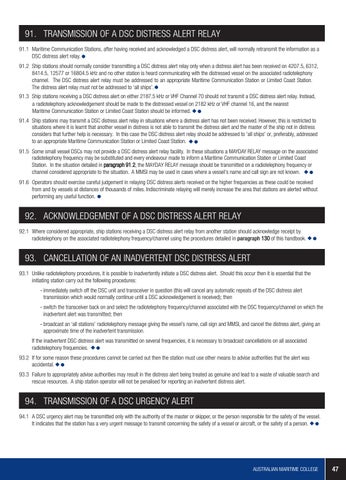91. lay 91.1 Maritime Communication Stations, after having received and acknowledged a DSC distress alert, will normally retransmit the information as a DSC distress alert relay. 91.2 Ship stations should normally consider transmitting a DSC distress alert relay only when a distress alert has been received on 4207.5, 6312, 8414.5, 12577 or 16804.5 kHz and no other station is heard communicating with the distressed vessel on the associated radiotelephony channel. The DSC distress alert relay must be addressed to an appropriate Maritime Communication Station or Limited Coast Station. The distress alert relay must not be addressed to ‘all ships’. 91.3 Ship stations receiving a DSC distress alert on either 2187.5 kHz or VHF Channel 70 should not transmit a DSC distress alert relay. Instead, a radiotelephony acknowledgement should be made to the distressed vessel on 2182 kHz or VHF channel 16, and the nearest Maritime Communication Station or Limited Coast Station should be informed. 91.4 Ship stations may transmit a DSC distress alert relay in situations where a distress alert has not been received. However, this is restricted to situations where it is learnt that another vessel in distress is not able to transmit the distress alert and the master of the ship not in distress considers that further help is necessary. In this case the DSC distress alert relay should be addressed to 'all ships' or, preferably, addressed to an appropriate Maritime Communication Station or Limited Coast Station. 91.5 Some small vessel DSCs may not provide a DSC distress alert relay facility. In these situations a MAYDAY RELAY message on the associated radiotelephony frequency may be substituted and every endeavour made to inform a Maritime Communication Station or Limited Coast Station. In the situation detailed in paragraph 91.2, the MAYDAY RELAY message should be transmitted on a radiotelephony frequency or channel considered appropriate to the situation. A MMSI may be used in cases where a vessel’s name and call sign are not known. 91.6 Operators should exercise careful judgement in relaying DSC distress alerts received on the higher frequencies as these could be received from and by vessels at distances of thousands of miles. Indiscriminate relaying will merely increase the area that stations are alerted without performing any useful function.
92. lay 92.1 Where considered appropriate, ship stations receiving a DSC distress alert relay from another station should acknowledge receipt by radiotelephony on the associated radiotelephony frequency/channel using the procedures detailed in paragraph 130 of this handbook.
93. Cancellation of an Inadvertent DSC Distress Alert 93.1 Unlike radiotelephony procedures, it is possible to inadvertently initiate a DSC distress alert. Should this occur then it is essential that the initiating station carry out the following procedures: - immediately switch off the DSC unit and transceiver in question (this will cancel any automatic repeats of the DSC distress alert transmission which would normally continue until a DSC acknowledgement is received); then - switch the transceiver back on and select the radiotelephony frequency/channel associated with the DSC frequency/channel on which the inadvertent alert was transmitted; then - broadcast an ‘all stations’ radiotelephony message giving the vessel’s name, call sign and MMSI, and cancel the distress alert, giving an approximate time of the inadvertent transmission. If the inadvertent DSC distress alert was transmitted on several frequencies, it is necessary to broadcast cancellations on all associated radiotelephony frequencies. 93.2 If for some reason these procedures cannot be carried out then the station must use other means to advise authorities that the alert was accidental. 93.3 Failure to appropriately advise authorities may result in the distress alert being treated as genuine and lead to a waste of valuable search and rescue resources. A ship station operator will not be penalised for reporting an inadvertent distress alert.
94. Transmission of a DSC Urgency Alert 94.1 A DSC urgency alert may be transmitted only with the authority of the master or skipper, or the person responsible for the safety of the vessel. It indicates that the station has a very urgent message to transmit concerning the safety of a vessel or aircraft, or the safety of a person.
AUSTRALIAN MARITIME COLLEGE
47
